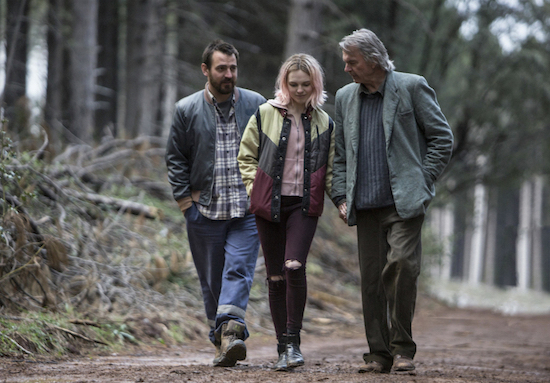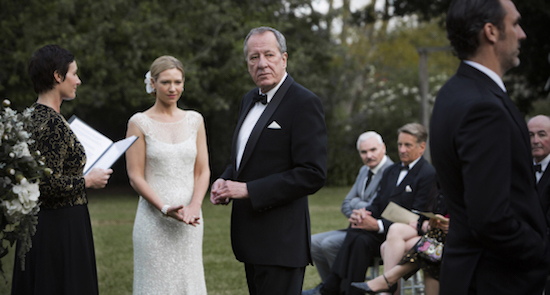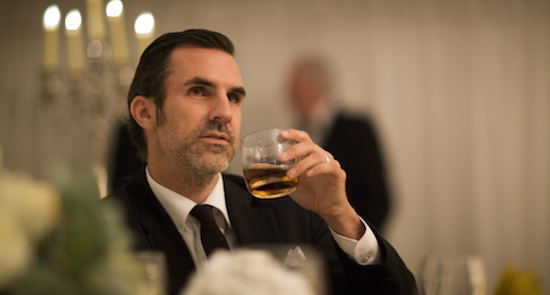Sins of the Father
A solid directorial and screenwriting debut by Australian actor and theater director Simon Stone, The Daughter borders on melodrama, but still manages to pack a considerable wallop. Stone originally converted Henrik Ibsen’s 1884 play The Wild Duck into a production set in present-day Australia for Sidney’s Belvoir St Theatre in 2011. Like that version, some of the original story’s details have been stripped away for The Daughter, yet the film retains a Nordic moodiness. As with live plays, the actors often sell the thing and The Daughter is no exception; Geoffrey Rush, Sam Neill, Miranda Otto and Ewen Leslie, especially, deliver intense performances that make the film’s escalating drama compelling throughout.
These events are set in motion by Christian (Paul Schneider), who returns to his Australian hometown after 15 years in the U.S. to attend the wedding of his father Henry (Rush)—a wealthy lumber mill owner—to his much younger housekeeper, Anna. There is obvious friction, as the son seems disgusted both by Anna’s age and the fact that his father is still using the car that belonged to his late wife, Christian’s mother.
Complicating things, Henry has just shut down the mill, leading to an exodus of unemployed workers and their families from the town. Christian’s childhood friend Oliver (Leslie) is one worker who hasn’t left; he and his wife Charlotte (Otto) dote on their daughter Hedvig (Odessa Young in a tough role), a bright high schooler who is also very close to Oliver’s father Walter (Neill). The latter, a rough-hewn but decent sort, keeps an animal sanctuary behind the house, where wounded creatures can recuperate. His newest rescue is a duck that Henry has shot. (Yes, the symbolism is pretty thick.)
We learn via a telephone and Skype calls back to the U.S., that though Christian and his wife have separated, she was planning to join him for the wedding. When she changes her mind despite his declaration that he’s stopped drinking, it becomes obvious that things haven’t been going so well for him. Clearly uncomfortable in his father’s house, he spends a lot of time leading up to the wedding with Oliver’s close-knit clan and their friends. During one of these gatherings Christian learns that Charlotte once worked as a housekeeper for Henry and he grabs hold of this fact like a starving dog with a bone. Connecting the dots, he begins asking pointed questions and angrily confronts Henry, believing that his father’s infidelity led to his mother’s unhappiness and subsequent suicide. “It was a complicated time,” Henry tries to explain. “I wanted to be happy.”
Christian is then bent on telling Oliver about Henry’s affair, believing that his friend deserves to know and that the truth will in fact be liberating for everyone involved. As in many a drama, things come to a head during a wedding scene, as Christian—hung over from the previous night’s blowout at a bar—gets re-plastered at his father and Anna’s reception. As things spiral completely out of control, curiosity (and dread) keep the viewer rapt, despite reservations we might have about the plausibility of some of the characters’ actions. (We also find out that Walter once took the fall for Henry when they were in business together, adding to the latter’s list of transgressions and the film’s pile-up of resentments.) When another—inevitable—secret is revealed, things take a turn for the tragic, as the unraveling Christian takes down almost everyone around him.
Whereas Ibsen’s play highlighted the tragic irony of the those with good intentions, The Daughter focuses more on how the “sins” of one individual eventually wreak havoc on two entire families. As over-the-top as some of the characters seem at times, and one does lose patience and sympathy, it’s hard not to get caught up in this story of human weakness, shame, hurt and duplicity; themes that are as relevant today as in the 19th century.
The Daughter opens on Friday, January 27, at Cinema Village in NYC.
—Marina Zogbi




